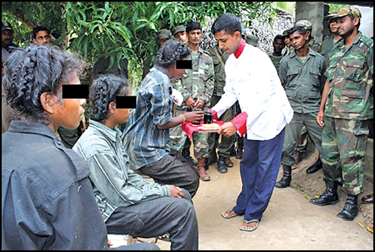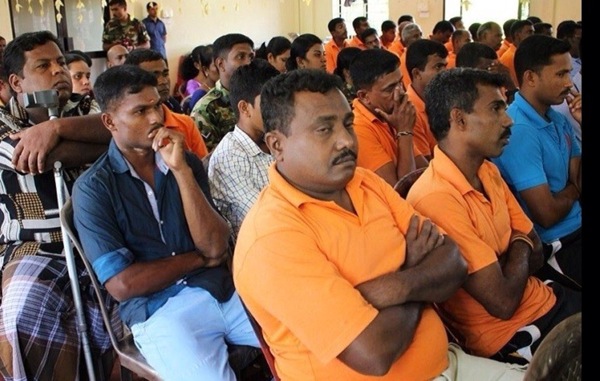Colombo, September 12 (NIA): Making a submission at a time when the UN Human Rights Council is to discuss Sri Lanka, the Tamil Lawyers’ Forum (TLF) on Monday petitioned the Office of the UN Human Rights Commissioner to set up a committee of scientists and medical professionals “of international repute” to examine former cadres of the Liberation Tigers of Tamil Eelam (LTTE) to see if they had been injected with poisonous substances while they were in detention.
“The very nature of poisonous substance makes it difficult for medical personnel to identify or detect such substance on the mere examination of victims. It is the duty of scientists with medical background and expertise and not merely medical doctors to identify the effects of the ingestion of external substances in the body,” the petition said.
The TLF has requested the Government of Sri Lanka to grant access for such a team of medical experts to conduct investigations on the victims.
The Northern Provincial Council (NPC) had passed a resolution on August 25 asking for a medical examination of the alleged victims. The provincial Chief Minister C.V.Wigneswaran requested the visiting US Air Force medical team to examine some. While the US government opted out, the provincial Health Ministry set up a panel of doctors to examine the cases.
“But the TLF is of the view that scientists should join any investigating committee for the sake of competence and credibility as ordinary medical personnel will not be able to detect the poisonous substances on their own,” said K.S.Ratnavale, Convenor of the TLF.
The TLF’s petition to the Office of the UN High Commissioner for human Rights says: “It has been observed that several former LTTE cadres in the prime of their life are suffering from physical disabilities ranging from debilitation, impairment, permanent privation of eyes, ears and other limbs, emasculation, deliriousness and disfiguration all of which could be traced from the time they were inmates of rehabilitation or detention centers.”
“Several such victims have made complaints to the Zonal Task Force on National Consultation and to various entities including Members of Parliament about their mysterious illnesses and therefore this issue cannot be easily ignored or trifled with. The Northern Provincial Council came up with a resolution passed on August 25, 2016 calling for medical investigation to be carried on the ex cadres by competent and trusted medical experts.’

“The numbers of dead among the category of excadres who have served time in Rehabilitation facilities stand at a high 107 within the last 4 to 5 years and have added weight to the seriousness of the allegation leveled against the Military and Defense establishment of Sri Lanka. It is also disconcerting that many of such victims have died of cancer related illnesses,” the petition said.
It pointed out that UK’s Channel 4 videos provide disturbing evidence of brutal, savage and sadistic attacks perpetrated on men, women and even children by Sri Lankan soldiers during the last days of the war.
“Till date, the Sri Lankan government authorities have not taken any action so far on the complaints. The victims have lost all hopes of the government initiating any action on their complaints. The opposition Tamil National Alliance sailing together with the present government and the TNA leader who is also the leader of the opposition have not made any remark, leave alone taking meaningful action.”
“It is therefore incumbent on the international community and the UN to address the grievances of the poison injection victims of Sri Lanka,” the petition said.
Poisoning Not New Internationally
Sri Lanka is not alone in the administration of poison on unsuspecting victims, the petition pointed out.
Super powers and oppressive regimes have resorted to injection of poison and lethal substances on their perceived dissidents and enemies. Victims of such covert operations suffer mysterious death, destruction of vital organs, heart attack, kidney failure, liver malfunction, cancer etc.

Alexendar Litvinenko, a Putin opponent died of Polonium-210 poisoning in 2006[1]. Kara-Matza an opposition leader in Russia survived a poison attempt on him after being in coma for a week. Alexendar Perplilichinyy who escaped to London,died of heart attack at the age of 44 in 2009, and his stomach had traces of glesemium, a rare poison plant known to have been used in China.
An Arab intelligence agent Khattab died in 2002 in Chechnya after opening a letter laced with a form of sarin, a nerve agent.
In 2008 Karinna Moskalenko, a Russian lawyer specializing in taking cases to the European Court of Human Rights, fell ill in strange manner from mercury found in her car.
More prominent public figures Alexander Solzhenitsyn, a Nobel Prize winner In 1970, confirmed in his biography that Ricin, a deadly chemical was involved in an attempt to destabilize him.
Ukraine’s pro-Western President Victor A. Yushchenko was left with his face disfigured after a Dioxin poisoning. These chemical substances are mostly tasteless, colourless and odorless which make their traces difficult to identify.
Poison stories abound in the international arena and therefore their existence in the local sphere cannot be discounted by any account ,the TLF said.




























































